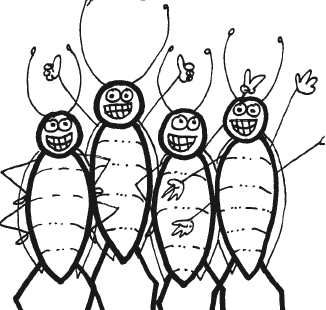
With a little bit of sleuthing, gamers can find all sorts of environmentally responsible ways to rid their homes and properties of unwanted pests with a new video game available from UNL Extension.
"Pest Private Eye and the Case of IPM in Schools" uses colorful characters like Pest Private Eye and his protege Penny Poe in a classic detective story format with up-to-date video gaming technology to teach fourth- through sixth-graders that swatting bugs, fixing screens to keep mosquitoes out or repairing a leaky faucet to discourage cockroach infestations are really part of IPM, or integrated pest management.
"IPM is all about controlling common pests using the lowest environment-impacting methods possible and to use chemical pesticides only after these other methods have been tried since pesticides ultimately get into our environment and water," said UNL Extension assistant Erin Bauer, who helped develop the game for the UNL Department of Agronomy and Horticulture's pesticide education office.
These low- to no-impact methods include sanitation, exclusion, moisture reduction, mechanical controls, habitat modification, biological controls and low-toxic chemicals.
"IPM reduces exposure to pesticides, increases human health and safety and protects the environment, concepts we want to teach people in ways they can relate to and easily learn from," Bauer said.
In Pest Private Eye, game players learn about IPM through a virtual investigation of Eureka Elementary, a school invaded by pests such as flies, roaches, rodents, ants and spiders.
"Game players learn about and use IPM strategies like reducing clutter or cleaning up trash, screening windows, sealing holes, fixing leaks, trapping and using low toxic baits. Using a magnifying glass when they see a pest, players learn about identifying pests before controlling them," Bauer explained.
They also learn about using protective clothing and equipment, such as gloves and HEPA masks when working with droppings, along with flashlights, sticky traps, snap traps, baits and trash bags.
Designed to meet public school curriculum standards, the game has been piloted in public libraries, summer 4-H camps and after school programs, Bauer said.
Biology students at Lincoln Southeast High School also tested the game extensively, she said.
Complementing the game is a teacher's guide with IPM activities for the classroom and a Pest Private Eye comic and coloring book.
The game is for sale as a DVD ($15) or computer download ($12), which helps UNL cover development costs over and above a grant from the U.S. Environmental Protection Agency's Pesticide Stewardship Education Program that helped create it.
As far as Bauer knows, it is the only comprehensive IPM video game of its type.
Internet links to a game demo, teacher's guide, comic book, and other IPM resources is online at http://schoolipm.unl.edu/pestpi/
- By Steve Ress, UNL Water Center
More details at: http://schoolipm.unl.edu/pestpi/